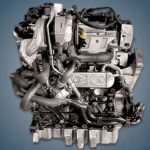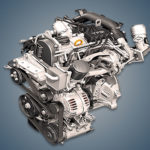The 1.4-liter Volkswagen BCA 16v engine was produced by the concern from 2001 to 2010 and was installed on such popular company models as the Golf, Bora, Caddy and the new Beetle. This power unit is known to many by the Skoda Octavia Tour.
The EA111-1.4 series includes: AEX, AKQ, AXP, BBY, BCA, BUD, CGGA, CGGB.
Specifications
| Production years | 2001-2010 |
| Displacement, cc | 1390 |
| Fuel system | injector |
| Power output, hp | 75 |
| Torque output, Nm | 126 |
| Cylinder block | aluminum R4 |
| Block head | aluminum 16v |
| Cylinder bore, mm | 76.5 |
| Piston stroke, mm | 75.6 |
| Compression ratio | 10.5 |
| Features | DOHC |
| Hydraulic lifters | yes |
| Timing drive | belt |
| Phase regulator | no |
| Turbocharging | no |
| Recommended engine oil | 5W-30 |
| Engine oil capacity, liter | 3.2 |
| Fuel type | petrol |
| Euro standards | EURO 3/4 |
| Fuel consumption, L/100 km (for VW Golf 5 2005) — city — highway — combined |
8.9 5.6 6.8 |
| Engine lifespan, km | ~280 000 |
The engine was installed on:
- Volkswagen Beetle 1 (9C) in 2001 – 2010;
- Volkswagen Bora 1 (1J) in 2002 – 2005;
- Volkswagen Caddy 3 (2K) in 2003 – 2006;
- Volkswagen Golf 4 (1J) in 2002 – 2006; Golf 5 (1K) in 2003 – 2006;
- Seat Leon 1 (1M) in 2003 – 2005;
- Skoda Octavia 1 (1U) in 2002 – 2010.
Disadvantages of the VW BCA engine
- This unit is considered quite reliable, but has one unpleasant feature.
- After 100,000 km, the oil receiver is often clogged and the lubricant pressure drops.
- Lack of oil sooner or later leads to a wedge of the camshaft or crankshaft.
- Timing belts can break and just from old age, but the valves bend in any case.
- Another disadvantage is noisy operation, as well as a low resource of ignition coils.






